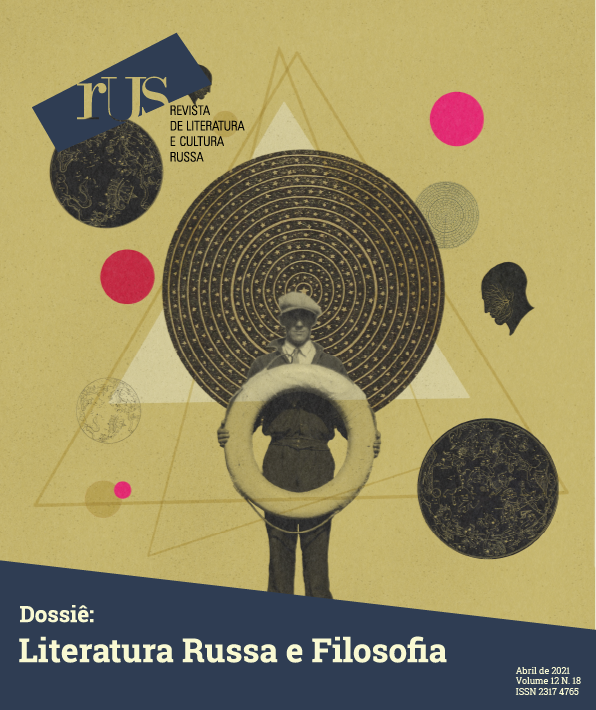How would Dostoevsky tell a life
DOI:
https://doi.org/10.11606/issn.2317-4765.rus.2021.181608Keywords:
Love, Body, Writing, Event, LieAbstract
The works of Proust and Dostoevsky – beyond the differences that mark them, in particular about a world with or without God, about the difference in the status of the narrator, and regarding interiority – share an essential trait: the characters, the situations, the intrigues that bind them together are never presented according to a principle of causality, which would allow a psychological explanation, but in the order of their perceptions diffracted by the narratives and impressions of the protagonists, and in the sense of their illusions, their beliefs, their certainties, that is to say in their very lives, as Dostoevsky tells them, which is what aroused the admiration of Proust. Two major philosophical questions are thus brought into play in properly romantic terms: what about the truth, what about the real?
Downloads
References
DOSTOIEVSKI, F. L’idiot, t. 1-2, trad. P. Pascal, Paris, Garnier-Flammarion, 1983.
DOSTOIEVSKI, F Crime et châtiment, trad. V. Pozner, Folio Classique Gallimard, 1975.
DOSTOIEVSKI, F, Les frères Karamazov, trad. H. Mongault, Folio Classique Gallimard, 1973.
DOSTOIEVSKI, F. Carnets des démons, Gallimard, Pléiade, 1955, trad. S. Luneau et B. de Schloezer.
DOSTOIEVSKI, F. Œuvres complètes, t. VII, « Journal d’un écrivain », Gallimard, Pléiade, 1972.
DOSTOIÉVSKI, F. L’adolescent in. Œuvres, Pléiade, VI, 1979.
DOSTOIÉVSKI, F. Les carnets du sous-sol, trad. A.Markowicz, Paris, Babel- Actes Sud, 1992.
FRAISSE, L. Introduction à son éd. de La Fugitive, Paris, Classiques Garnier, 2017.
NIETZSCHE, F. Le gai savoir, Collection Folio essais (n° 17), Gallimard, 1989.
PROUST, Lettres choisies, Paris, Plon, 2004.
PROUST, M. Correspondance, t. 19, Paris, Plon, 1991.
PROUST, M. A la recherche du temps perdu, éd. Tadié, Pléiade, I.
PROUST, M. A la recherche du temps perdu, éd. Tadié, Pléiade, II.
PROUST, M. A la recherche du temps perdu, éd. Tadié, Pléiade, III.
PROUST, M. A la recherche du temps perdu, éd. Tadié, Pléiade, IV.
PROUST, M. Contre Sainte-Beuve, Folio Essais Gallimard, 1954,.
SCHELLING, F. Philosophie de la révélation, livre II, trad. Marquet/Courtine, PUF, Epiméthée, 1991.
GIDE, A. Dostoievski, articles et causeries, Paris, Plon, 1923, rééd Gallimard, 1964.
NABOKOV, V. Littératures, Bouquins éditions, Paris, 2010.
TADIE, Jean-Yves, Proust et le roman, Tel Gallimard, 1971.
VALERY, Paul. Œuvres I, Gallimard, Pléiade, 1957.
Downloads
Published
Issue
Section
License
Copyright (c) 2021 Gerard Bensussan

This work is licensed under a Creative Commons Attribution-NonCommercial-ShareAlike 4.0 International License.
Authors who publish in RUS agree to the following terms:
a. Authors retain copyright and grant the journal right of first publication with the work simultaneously licensed under a Creative Commons Attribution 4.0 International License (CC BY-NC-SA 4.0) that allows others to share the work with an acknowledgement of the work’s authorship and initial publication in this journal.
b. Authors are able to enter into separate, additional contractual arrangements for the non-exclusive distribution of the journal’s published version of the work (e.g., post it to an institutional repository or publish it in a book), with an acknowledgement of its initial publication in this journal.
c. Authors are permitted and encouraged to post their work online (e.g., in institutional repositories or on their website) prior to and during the submission process, as it can lead to productive exchanges, as well as earlier and greater citation of published work (See The Effect of Open Access).





